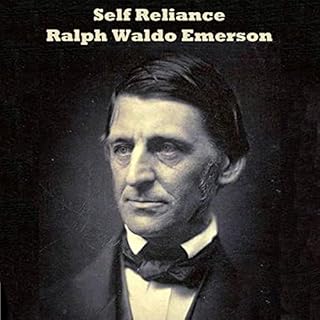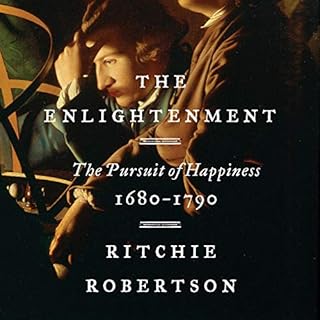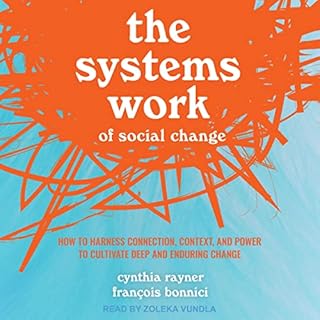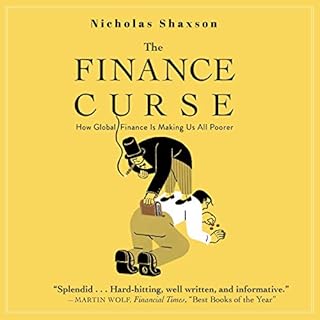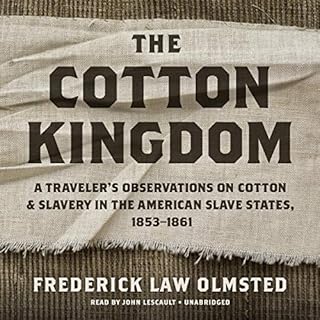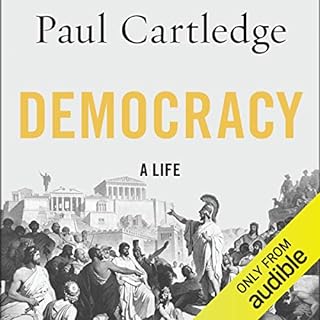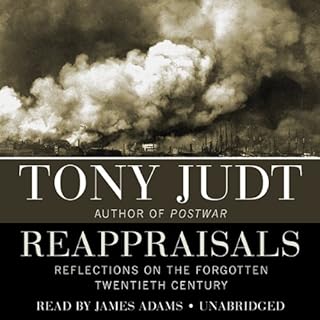
The Afterlives of the Terror
Facing the Legacies of Mass Violence in Postrevolutionary France
Failed to add items
Add to Cart failed.
Add to Wish List failed.
Remove from wishlist failed.
Adding to library failed
Follow podcast failed
Unfollow podcast failed
 Prime members: New to Audible?
Prime members: New to Audible?Get 2 free audiobooks during trial.
Buy for $19.95
No default payment method selected.
We are sorry. We are not allowed to sell this product with the selected payment method
-
Narrated by:
-
Simon Barber
-
By:
-
Ronen Steinberg
About this listen
The Afterlives of the Terror explores how those who experienced the mass violence of the French Revolution struggled to come to terms with it. Focusing on the Reign of Terror, Ronen Steinberg challenges the presumption that its aftermath was characterized by silence and enforced collective amnesia. Instead, he shows that there were painful, complex, and sometimes surprisingly honest debates about how to deal with its legacies.
As The Afterlives of the Terror shows, revolutionary leaders, victims' families, and ordinary citizens argued about accountability, retribution, redress, and commemoration. Drawing on the concept of transitional justice and the scholarship on the major traumas of the twentieth century, Steinberg explores how the French tried, but ultimately failed, to leave this difficult past behind. He argues that it was the same democratizing, radicalizing dynamic that led to the violence of the Terror, which also gave rise to an unprecedented interrogation of how society is affected by events of enormous brutality. In this sense, the modern question of what to do with difficult pasts is one of the unanticipated consequences of the 18th century's age of democratic revolutions.
The book is published by Cornell University Press. The audiobook is published by University Press Audiobooks.
"Steinberg's excellent new book looks at the aftermath of the Reign of Terror in France through the modern lens of transitional justice." (Choice)
"Steinberg's engaging history will profitably engage French Revolutionists and scholars of trauma and mass violence." (American Historical Review)
"Steinberg's book imaginatively brings together different themes and sources, from property disputes to ghost stories, public trials to medical disputes." (Journal of Modern History)
©2019 Cornell University (P)2023 Redwood AudiobooksListeners also enjoyed...
-
Revolutionary Spring
- Europe Aflame and the Fight for a New World, 1848-1849
- By: Christopher Clark
- Narrated by: Christopher Clark
- Length: 33 hrs and 26 mins
- Unabridged
-
Overall4.5 out of 5 stars 51
-
Performance4.5 out of 5 stars 44
-
Story4.5 out of 5 stars 44
As history, the uprisings of 1848 have long been overshadowed by the French Revolution of 1789 and the Russian revolutions of the early twentieth century. And yet in 1848 nearly all of Europe was aflame with conflict. Parallel political tumults spread like brush fire across the entire continent, leading to significant changes that continue to shape our world today. These battles for the future were fought with one eye kept squarely on the past. Revolutionary Spring is a new understanding of 1848 that offers chilling parallels to our present moment.
-
2 out of 5 stars
-
Like the revolutions, it got off to a good start
- By Anonymous User on 06-23-23
-
The Blazing World
- A New History of Revolutionary England, 1603-1689
- By: Jonathan Healey
- Narrated by: Oliver Hembrough
- Length: 19 hrs and 42 mins
- Unabridged
-
Overall4.5 out of 5 stars 96
-
Performance4.5 out of 5 stars 80
-
Story4.5 out of 5 stars 81
The seventeenth century was a revolutionary age for the English. It started as they suddenly found themselves ruled by a Scotsman, and it ended in the shadow of an invasion by the Dutch. Under James I, England suffered terrorism and witch panics. Under his son Charles, state and society collapsed into civil war, to be followed by an army coup and regicide. For a short time—for the only time in history—England was a republic. There were bitter struggles over faith and Parliament asserted itself like never before. There were no boundaries to politics.
-
5 out of 5 stars
-
Been looking for this book for a long time
- By cmurrell on 07-30-23
By: Jonathan Healey
-
The Story of Philosophy
- The Lives and Opinions of the Greater Philosophers
- By: Will Durant
- Narrated by: Grover Gardner
- Length: 19 hrs and 27 mins
- Unabridged
-
Overall4.5 out of 5 stars 1,854
-
Performance4.5 out of 5 stars 1,501
-
Story4.5 out of 5 stars 1,485
Durant lucidly describes the philosophical systems of such world-famous “monarchs of the mind” as Plato, Aristotle, Francis Bacon, Spinoza, Kant, Voltaire, and Nietzsche. Along with their ideas, he offers their flesh-and-blood biographies, placing their thoughts within their own time and place and elucidating their influence on our modern intellectual heritage. This book is packed with wisdom and wit.
-
5 out of 5 stars
-
Fantastic and insightful book
- By ESK on 01-25-13
By: Will Durant
-
Self Reliance
- By: Ralph Waldo Emerson
- Narrated by: Alana Munro
- Length: 1 hr and 20 mins
- Unabridged
-
Overall4 out of 5 stars 1,033
-
Performance4 out of 5 stars 872
-
Story4 out of 5 stars 862
The most thorough statement of one of Emerson's recurrent themes, the need for each individual to avoid conformity and false consistency, and follow his or her own instincts and ideas. It is the source of one of Emerson's most famous quotations, "A foolish consistency is the hobgoblin of little minds." This essay is a considered a watershed moment in which transcendentalism became a major cultural movement. An American classic.
-
1 out of 5 stars
-
Don't buy this
- By Leah L on 07-31-16
-
Crimea
- By: Orlando Figes
- Narrated by: Malk Williams
- Length: 20 hrs and 38 mins
- Unabridged
-
Overall4.5 out of 5 stars 519
-
Performance4.5 out of 5 stars 454
-
Story4.5 out of 5 stars 451
The terrible conflict that dominated the mid-19th century, the Crimean War, killed at least 800,000 men and pitted Russia against a formidable coalition of Britain, France and the Ottoman Empire. It was a war for territory, provoked by fear that if the Ottoman Empire were to collapse then Russia could control a huge swathe of land from the Balkans to the Persian Gulf. But it was also a war of religion, driven by a fervent, populist and ever more ferocious belief by the Tsar and his ministers that it was Russia's task to rule all Orthodox Christians and control the Holy Land.
-
5 out of 5 stars
-
Outstanding History of the Crimean War
- By Rick Sailor on 11-08-18
By: Orlando Figes
-
Seapower States
- Maritime Culture, Continental Empires, and the Conflict That Made the Modern World
- By: Andrew Lambert
- Narrated by: Julian Elfer
- Length: 13 hrs and 43 mins
- Unabridged
-
Overall4 out of 5 stars 44
-
Performance4.5 out of 5 stars 33
-
Story4.5 out of 5 stars 33
Andrew Lambert, author of The Challenge - winner of the prestigious Anderson Medal - turns his attention to Athens, Carthage, Venice, the Dutch Republic, and Britain, examining how their identities as "seapowers" informed their actions and enabled them to achieve success disproportionate to their size. Lambert demonstrates how creating maritime identities made these states more dynamic, open, and inclusive than their lumbering continental rivals. Only when they forgot this aspect of their identity did these nations begin to decline.
-
1 out of 5 stars
-
only got 1 hour or so through
- By fm2 on 01-14-19
By: Andrew Lambert
-
Revolutionary Spring
- Europe Aflame and the Fight for a New World, 1848-1849
- By: Christopher Clark
- Narrated by: Christopher Clark
- Length: 33 hrs and 26 mins
- Unabridged
-
Overall4.5 out of 5 stars 51
-
Performance4.5 out of 5 stars 44
-
Story4.5 out of 5 stars 44
As history, the uprisings of 1848 have long been overshadowed by the French Revolution of 1789 and the Russian revolutions of the early twentieth century. And yet in 1848 nearly all of Europe was aflame with conflict. Parallel political tumults spread like brush fire across the entire continent, leading to significant changes that continue to shape our world today. These battles for the future were fought with one eye kept squarely on the past. Revolutionary Spring is a new understanding of 1848 that offers chilling parallels to our present moment.
-
2 out of 5 stars
-
Like the revolutions, it got off to a good start
- By Anonymous User on 06-23-23
-
The Blazing World
- A New History of Revolutionary England, 1603-1689
- By: Jonathan Healey
- Narrated by: Oliver Hembrough
- Length: 19 hrs and 42 mins
- Unabridged
-
Overall4.5 out of 5 stars 96
-
Performance4.5 out of 5 stars 80
-
Story4.5 out of 5 stars 81
The seventeenth century was a revolutionary age for the English. It started as they suddenly found themselves ruled by a Scotsman, and it ended in the shadow of an invasion by the Dutch. Under James I, England suffered terrorism and witch panics. Under his son Charles, state and society collapsed into civil war, to be followed by an army coup and regicide. For a short time—for the only time in history—England was a republic. There were bitter struggles over faith and Parliament asserted itself like never before. There were no boundaries to politics.
-
5 out of 5 stars
-
Been looking for this book for a long time
- By cmurrell on 07-30-23
By: Jonathan Healey
-
The Story of Philosophy
- The Lives and Opinions of the Greater Philosophers
- By: Will Durant
- Narrated by: Grover Gardner
- Length: 19 hrs and 27 mins
- Unabridged
-
Overall4.5 out of 5 stars 1,854
-
Performance4.5 out of 5 stars 1,501
-
Story4.5 out of 5 stars 1,485
Durant lucidly describes the philosophical systems of such world-famous “monarchs of the mind” as Plato, Aristotle, Francis Bacon, Spinoza, Kant, Voltaire, and Nietzsche. Along with their ideas, he offers their flesh-and-blood biographies, placing their thoughts within their own time and place and elucidating their influence on our modern intellectual heritage. This book is packed with wisdom and wit.
-
5 out of 5 stars
-
Fantastic and insightful book
- By ESK on 01-25-13
By: Will Durant
-
Self Reliance
- By: Ralph Waldo Emerson
- Narrated by: Alana Munro
- Length: 1 hr and 20 mins
- Unabridged
-
Overall4 out of 5 stars 1,033
-
Performance4 out of 5 stars 872
-
Story4 out of 5 stars 862
The most thorough statement of one of Emerson's recurrent themes, the need for each individual to avoid conformity and false consistency, and follow his or her own instincts and ideas. It is the source of one of Emerson's most famous quotations, "A foolish consistency is the hobgoblin of little minds." This essay is a considered a watershed moment in which transcendentalism became a major cultural movement. An American classic.
-
1 out of 5 stars
-
Don't buy this
- By Leah L on 07-31-16
-
Crimea
- By: Orlando Figes
- Narrated by: Malk Williams
- Length: 20 hrs and 38 mins
- Unabridged
-
Overall4.5 out of 5 stars 519
-
Performance4.5 out of 5 stars 454
-
Story4.5 out of 5 stars 451
The terrible conflict that dominated the mid-19th century, the Crimean War, killed at least 800,000 men and pitted Russia against a formidable coalition of Britain, France and the Ottoman Empire. It was a war for territory, provoked by fear that if the Ottoman Empire were to collapse then Russia could control a huge swathe of land from the Balkans to the Persian Gulf. But it was also a war of religion, driven by a fervent, populist and ever more ferocious belief by the Tsar and his ministers that it was Russia's task to rule all Orthodox Christians and control the Holy Land.
-
5 out of 5 stars
-
Outstanding History of the Crimean War
- By Rick Sailor on 11-08-18
By: Orlando Figes
-
Seapower States
- Maritime Culture, Continental Empires, and the Conflict That Made the Modern World
- By: Andrew Lambert
- Narrated by: Julian Elfer
- Length: 13 hrs and 43 mins
- Unabridged
-
Overall4 out of 5 stars 44
-
Performance4.5 out of 5 stars 33
-
Story4.5 out of 5 stars 33
Andrew Lambert, author of The Challenge - winner of the prestigious Anderson Medal - turns his attention to Athens, Carthage, Venice, the Dutch Republic, and Britain, examining how their identities as "seapowers" informed their actions and enabled them to achieve success disproportionate to their size. Lambert demonstrates how creating maritime identities made these states more dynamic, open, and inclusive than their lumbering continental rivals. Only when they forgot this aspect of their identity did these nations begin to decline.
-
1 out of 5 stars
-
only got 1 hour or so through
- By fm2 on 01-14-19
By: Andrew Lambert
-
The War That Ended Peace
- The Road to 1914
- By: Margaret MacMillan
- Narrated by: Richard Burnip
- Length: 31 hrs and 58 mins
- Unabridged
-
Overall4.5 out of 5 stars 996
-
Performance4.5 out of 5 stars 899
-
Story4.5 out of 5 stars 888
From the best-selling and award-winning author of Paris 1919 comes a masterpiece of narrative nonfiction, a fascinating portrait of Europe from 1900 up to the outbreak of World War I.
-
4 out of 5 stars
-
Detailed review of 1882 to 1914
- By smarmer on 04-06-14
-
Our History Has Always Been Contraband
- In Defense of Black Studies
- By: Colin Kaepernick - editor, Robin D.G. Kelley - editor, Keeanga-Yamahtta Taylor - editor
- Narrated by: Jaime Lincoln Smith
- Length: 5 hrs and 57 mins
- Unabridged
-
Overall5 out of 5 stars 4
-
Performance5 out of 5 stars 4
-
Story5 out of 5 stars 4
Since its founding as a discipline, Black Studies has been under relentless attack by social and political forces seeking to discredit and neutralize it. Our History Has Always Been Contraband was born out of an urgent need to respond to the latest threat: efforts to remove content from an AP African American Studies course being piloted in high schools across the United States.
-
5 out of 5 stars
-
What a great way to outline important black history narratives
- By Amanda Pratt on 03-16-24
By: Colin Kaepernick - editor, and others
-
The Enlightenment
- The Pursuit of Happiness, 1680-1790
- By: Ritchie Robertson
- Narrated by: Jonathan Keeble
- Length: 40 hrs and 9 mins
- Unabridged
-
Overall4.5 out of 5 stars 273
-
Performance4.5 out of 5 stars 221
-
Story4.5 out of 5 stars 221
This magisterial history - sure to become the definitive work on the subject - recasts the Enlightenment as a period not solely consumed with rationale and reason, but rather as a pursuit of practical means to achieve greater human happiness.
-
5 out of 5 stars
-
The quickest 40 hour audio book I’ve listen to
- By Joey Caster on 04-02-21
-
The Dark Ages: 476-918
- By: Charles Oman
- Narrated by: Charlton Griffin
- Length: 19 hrs and 30 mins
- Unabridged
-
Overall4.5 out of 5 stars 288
-
Performance4.5 out of 5 stars 250
-
Story4.5 out of 5 stars 247
The Dark Ages is the story of the birth of Western civilization. It was a harrowing crucible of war, destruction, and faith. For over 100 years, Charles Oman's famous history has remained one of the finest sources for the study of this period. Covering a period of 500 years and an area stretching from Northern Germany to Egypt, this is the definitive history that will alter your conceptions of a period of history that gave birth to the civilization we live in today.
-
5 out of 5 stars
-
An Excellent Production
- By Ken on 08-11-17
By: Charles Oman
-
The Essential John Locke
- Essential Scholars
- By: Eric Mack
- Narrated by: Michael Lenz
- Length: 2 hrs and 43 mins
- Unabridged
-
Overall4 out of 5 stars 2
-
Performance5 out of 5 stars 1
-
Story5 out of 5 stars 1
No single individual is ever the sole founder of any major stance in political philosophy. Nevertheless, if one were forced to name the founder of the classical liberal perspective in political thought which holds as its primary political principle that individual liberty is to be respected and protected, one would have to point to the English philosopher John Locke.
By: Eric Mack
-
The Byzantine World War
- By: Nick Holmes
- Narrated by: Martin Carroll
- Length: 5 hrs and 18 mins
- Unabridged
-
Overall4.5 out of 5 stars 16
-
Performance4.5 out of 5 stars 15
-
Story4.5 out of 5 stars 15
The Crusades shook the world. But why did they happen? Their origins are revealed in a new light. As part of a medieval world war that stretched from Asia to Europe. At its center was an ancient empire Byzantium. Told for the first time as a single, linked narrative are three great events that changed history: The fall of Byzantium in the 11th century, the epic campaign of the First Crusade and the origins of modern Turkey. Nick Holmes not only presents the First Crusade in a wider global context but he also puts forwards new interpretations of the original sources.
-
4 out of 5 stars
-
Learned a lot.
- By Margaret on 11-23-20
By: Nick Holmes
-
The Systems Work of Social Change
- How to Harness Connection, Context, and Power to Cultivate Deep and Enduring Change
- By: Cynthia Rayner, Francois Bonnici
- Narrated by: Zoleka Vundla
- Length: 8 hrs and 8 mins
- Unabridged
-
Overall5 out of 5 stars 1
-
Performance0 out of 5 stars 0
-
Story0 out of 5 stars 0
The issues of poverty, inequality, racial injustice, and climate change have never been more pressing or paralyzing. Current approaches to social change, which rely on linear thinking and traditional power dynamics to "solve" social problems, are not helping. In fact, they may only be entrenching the status quo. This book draws on stories of committed social changemakers to uncover a set of principles and practices for social change that dramatically depart from the industrial approach. Simple yet profound, these stories distill timely lessons for leaders, scholars, and policymakers.
By: Cynthia Rayner, and others
-
A New World Begins
- The History of the French Revolution
- By: Jeremy D. Popkin
- Narrated by: Pete Cross, Jeremy D. Popkin
- Length: 21 hrs and 54 mins
- Unabridged
-
Overall4.5 out of 5 stars 309
-
Performance4.5 out of 5 stars 265
-
Story4.5 out of 5 stars 264
The principles of the French Revolution remain the only possible basis for a just society - even if, after more than 200 years, they are more contested than ever before. In A New World Begins, Jeremy D. Popkin offers a riveting account of the revolution that puts the listener in the thick of the debates and the violence that led to the overthrow of the monarchy and the establishment of a new society.
-
5 out of 5 stars
-
Narration
- By Kindle Customer on 04-26-22
By: Jeremy D. Popkin
-
Out of Italy
- Two Centuries of World Domination and Demise
- By: Fernand Braudel, Siân Reynolds - translator
- Narrated by: Paul Brion
- Length: 7 hrs and 5 mins
- Unabridged
-
Overall5 out of 5 stars 8
-
Performance5 out of 5 stars 6
-
Story5 out of 5 stars 6
In the fifteenth century, even before the city states of the Apennine Peninsula began to coalesce into what would become, several centuries later, a nation, "Italy" exerted enormous influence over all of Europe and throughout the Mediterranean. Viewing the Italy (the many Italies?) of that time through the lens of today allows us to gather a fragmented, multi-faceted, and seemingly contradictory history into a single unifying narrative that speaks to our current reality as much as it does to a specific historical period. This is what the French historian Fernand Braudel achieves here.
-
5 out of 5 stars
-
shortened version of other works by Braudel
- By Anonymous User on 06-27-24
By: Fernand Braudel, and others
-
The Finance Curse
- How Global Finance Is Making Us All Poorer
- By: Nicholas Shaxson
- Narrated by: Simon Mattacks
- Length: 12 hrs and 2 mins
- Unabridged
-
Overall4.5 out of 5 stars 21
-
Performance4.5 out of 5 stars 15
-
Story4.5 out of 5 stars 15
Financial journalist Nicholas Shaxson first made his reputation studying the “resource curse,” seeing first-hand the disastrous economic and societal effects of the discovery of oil in Angola. He then gained prominence as an expert on tax havens, revealing the dark corners of that world long before the scandals of the Panama and Paradise Papers.
-
5 out of 5 stars
-
Brilliant!...The Finance Curse reveals
- By anthony1429 on 02-10-22
By: Nicholas Shaxson
-
The Cotton Kingdom
- A Traveler’s Observations on Cotton and Slavery in the American Slave States, 1853-1861
- By: Frederick Law Olmsted
- Narrated by: John Lescault
- Length: 24 hrs and 29 mins
- Unabridged
-
Overall4.5 out of 5 stars 29
-
Performance4.5 out of 5 stars 24
-
Story5 out of 5 stars 23
The Cotton Kingdom recounts his daily observations of the curse of slavery: the poverty it brought to both black and white people, the inadequacies of the plantation system, and the economic consequences and problems associated with America’s most “peculiar institution.” Disproving the opinion that “cotton is king”, Olmsted examined the huge differences between the economies of the northern and southern states, contrasting the more successful, wealthy, and progressive North with the South, which was stubbornly convinced of the necessity of slavery.
-
5 out of 5 stars
-
UNDERAPPRECIATED CLASSIC
- By philip on 05-19-22
-
The Craft
- How the Freemasons Made the Modern World
- By: John Dickie
- Narrated by: Simon Slater
- Length: 16 hrs and 35 mins
- Unabridged
-
Overall4 out of 5 stars 202
-
Performance4.5 out of 5 stars 168
-
Story4.5 out of 5 stars 168
Founded in London in 1717 as a way of binding men in fellowship, Freemasonry proved so addictive that within two decades it had spread across the globe. Masonic influence became pervasive. Under George Washington, the Craft became a creed for the new American nation. Masonic networks held the British empire together. Under Napoleon, the Craft became a tool of authoritarianism and then a cover for revolutionary conspiracy. Both the Mormon Church and the Sicilian mafia owe their origins to Freemasonry.
-
5 out of 5 stars
-
The best book about Freemasonry out there.
- By Isaac Pea on 02-19-21
By: John Dickie
Related to this topic
-
The Craft
- How the Freemasons Made the Modern World
- By: John Dickie
- Narrated by: Simon Slater
- Length: 16 hrs and 35 mins
- Unabridged
-
Overall4 out of 5 stars 202
-
Performance4.5 out of 5 stars 168
-
Story4.5 out of 5 stars 168
Founded in London in 1717 as a way of binding men in fellowship, Freemasonry proved so addictive that within two decades it had spread across the globe. Masonic influence became pervasive. Under George Washington, the Craft became a creed for the new American nation. Masonic networks held the British empire together. Under Napoleon, the Craft became a tool of authoritarianism and then a cover for revolutionary conspiracy. Both the Mormon Church and the Sicilian mafia owe their origins to Freemasonry.
-
5 out of 5 stars
-
The best book about Freemasonry out there.
- By Isaac Pea on 02-19-21
By: John Dickie
-
Germany
- A Nation in Its Time: Before, During, and After Nationalism, 1500-2000
- By: Helmut Walser Smith
- Narrated by: Paul Woodson
- Length: 20 hrs and 23 mins
- Unabridged
-
Overall4 out of 5 stars 52
-
Performance4.5 out of 5 stars 43
-
Story4 out of 5 stars 42
For nearly a century, historians have depicted Germany as a rabidly nationalist land, born in a sea of aggression. Not so, says Helmut Walser Smith, who, in this groundbreaking 500-year history, challenges traditional perceptions of Germany's conflicted past, revealing a nation far more thematically complicated than 20th-century historians have imagined.
-
3 out of 5 stars
-
He may understand the past but he does not comprehend the present.
- By Max TN on 06-23-23
-
Democracy
- A Life
- By: Paul Cartledge
- Narrated by: Paul Hodgson
- Length: 13 hrs and 32 mins
- Unabridged
-
Overall4.5 out of 5 stars 34
-
Performance4.5 out of 5 stars 29
-
Story4.5 out of 5 stars 28
Ancient Greece first coined the concept of democracy, yet almost every major ancient Greek thinker - from Plato and Aristotle onward - was ambivalent toward or even hostile to democracy in any form. The explanation for this is quite simple: The elite perceived majority power as tantamount to a dictatorship of the proletariat. In ancient Greece, there can be traced not only the rudiments of modern democratic society but the entire Western tradition of antidemocratic thought.
-
5 out of 5 stars
-
Great Listen!
- By Timothy on 06-01-21
By: Paul Cartledge
-
The Popes Against the Jews
- The Vatican's Role in the Rise of Modern Anti-Semitism
- By: David I. Kertzer
- Narrated by: Arthur Morey
- Length: 13 hrs and 17 mins
- Unabridged
-
Overall5 out of 5 stars 41
-
Performance5 out of 5 stars 33
-
Story5 out of 5 stars 33
Pope John Paul II, as part of his effort to improve Catholic-Jewish relations, himself called for a clear-eyed historical investigation into any possible link between the Church and the Holocaust. An important sign of his commitment was the decision to allow the distinguished historian David I. Kertzer, a specialist in Italian history, to be one of the first scholars given access to long-sealed Vatican archives. The result is a book filled with shocking revelations.
-
5 out of 5 stars
-
A stunning expose.
- By Paul on 03-05-22
By: David I. Kertzer
-
Reappraisals
- Reflections on the Forgotten 20th Century
- By: Tony Judt
- Narrated by: James Adams
- Length: 16 hrs and 53 mins
- Unabridged
-
Overall4.5 out of 5 stars 161
-
Performance4.5 out of 5 stars 92
-
Story4.5 out of 5 stars 90
The accelerating changes of the past generation have been accompanied by a similarly accelerated amnesia. The 20th century has become "history" at an unprecedented rate. The world of 2007 was so utterly unlike that of even 1987, much less any earlier time, that we have lost touch with our immediate past even before we have begun to make sense of it - and the results are proving calamitous.
-
5 out of 5 stars
-
Superb. Insightful essays, Performance to match
- By Louis on 05-02-12
By: Tony Judt
-
Embracing Defeat
- By: John W. Dower
- Narrated by: Edward Lewis
- Length: 21 hrs and 38 mins
- Unabridged
-
Overall4 out of 5 stars 430
-
Performance3.5 out of 5 stars 295
-
Story4 out of 5 stars 300
This illuminating study explores the ways in which the shattering defeat of the Japanese in World War II, followed by over six years of American military occupation, affected every level of Japanese society. The author describes the countless ways in which the Japanese met the challenge of "starting over", from top-level manipulations concerning the fate of Emperor Hirohito to the hopes, fears, and activities of ordinary men and women in every walk of life.
-
4 out of 5 stars
-
Pulitzer Prize Winner!
- By KF on 10-09-07
By: John W. Dower
-
The Craft
- How the Freemasons Made the Modern World
- By: John Dickie
- Narrated by: Simon Slater
- Length: 16 hrs and 35 mins
- Unabridged
-
Overall4 out of 5 stars 202
-
Performance4.5 out of 5 stars 168
-
Story4.5 out of 5 stars 168
Founded in London in 1717 as a way of binding men in fellowship, Freemasonry proved so addictive that within two decades it had spread across the globe. Masonic influence became pervasive. Under George Washington, the Craft became a creed for the new American nation. Masonic networks held the British empire together. Under Napoleon, the Craft became a tool of authoritarianism and then a cover for revolutionary conspiracy. Both the Mormon Church and the Sicilian mafia owe their origins to Freemasonry.
-
5 out of 5 stars
-
The best book about Freemasonry out there.
- By Isaac Pea on 02-19-21
By: John Dickie
-
Germany
- A Nation in Its Time: Before, During, and After Nationalism, 1500-2000
- By: Helmut Walser Smith
- Narrated by: Paul Woodson
- Length: 20 hrs and 23 mins
- Unabridged
-
Overall4 out of 5 stars 52
-
Performance4.5 out of 5 stars 43
-
Story4 out of 5 stars 42
For nearly a century, historians have depicted Germany as a rabidly nationalist land, born in a sea of aggression. Not so, says Helmut Walser Smith, who, in this groundbreaking 500-year history, challenges traditional perceptions of Germany's conflicted past, revealing a nation far more thematically complicated than 20th-century historians have imagined.
-
3 out of 5 stars
-
He may understand the past but he does not comprehend the present.
- By Max TN on 06-23-23
-
Democracy
- A Life
- By: Paul Cartledge
- Narrated by: Paul Hodgson
- Length: 13 hrs and 32 mins
- Unabridged
-
Overall4.5 out of 5 stars 34
-
Performance4.5 out of 5 stars 29
-
Story4.5 out of 5 stars 28
Ancient Greece first coined the concept of democracy, yet almost every major ancient Greek thinker - from Plato and Aristotle onward - was ambivalent toward or even hostile to democracy in any form. The explanation for this is quite simple: The elite perceived majority power as tantamount to a dictatorship of the proletariat. In ancient Greece, there can be traced not only the rudiments of modern democratic society but the entire Western tradition of antidemocratic thought.
-
5 out of 5 stars
-
Great Listen!
- By Timothy on 06-01-21
By: Paul Cartledge
-
The Popes Against the Jews
- The Vatican's Role in the Rise of Modern Anti-Semitism
- By: David I. Kertzer
- Narrated by: Arthur Morey
- Length: 13 hrs and 17 mins
- Unabridged
-
Overall5 out of 5 stars 41
-
Performance5 out of 5 stars 33
-
Story5 out of 5 stars 33
Pope John Paul II, as part of his effort to improve Catholic-Jewish relations, himself called for a clear-eyed historical investigation into any possible link between the Church and the Holocaust. An important sign of his commitment was the decision to allow the distinguished historian David I. Kertzer, a specialist in Italian history, to be one of the first scholars given access to long-sealed Vatican archives. The result is a book filled with shocking revelations.
-
5 out of 5 stars
-
A stunning expose.
- By Paul on 03-05-22
By: David I. Kertzer
-
Reappraisals
- Reflections on the Forgotten 20th Century
- By: Tony Judt
- Narrated by: James Adams
- Length: 16 hrs and 53 mins
- Unabridged
-
Overall4.5 out of 5 stars 161
-
Performance4.5 out of 5 stars 92
-
Story4.5 out of 5 stars 90
The accelerating changes of the past generation have been accompanied by a similarly accelerated amnesia. The 20th century has become "history" at an unprecedented rate. The world of 2007 was so utterly unlike that of even 1987, much less any earlier time, that we have lost touch with our immediate past even before we have begun to make sense of it - and the results are proving calamitous.
-
5 out of 5 stars
-
Superb. Insightful essays, Performance to match
- By Louis on 05-02-12
By: Tony Judt
-
Embracing Defeat
- By: John W. Dower
- Narrated by: Edward Lewis
- Length: 21 hrs and 38 mins
- Unabridged
-
Overall4 out of 5 stars 430
-
Performance3.5 out of 5 stars 295
-
Story4 out of 5 stars 300
This illuminating study explores the ways in which the shattering defeat of the Japanese in World War II, followed by over six years of American military occupation, affected every level of Japanese society. The author describes the countless ways in which the Japanese met the challenge of "starting over", from top-level manipulations concerning the fate of Emperor Hirohito to the hopes, fears, and activities of ordinary men and women in every walk of life.
-
4 out of 5 stars
-
Pulitzer Prize Winner!
- By KF on 10-09-07
By: John W. Dower
-
The Enlightenment
- The Pursuit of Happiness, 1680-1790
- By: Ritchie Robertson
- Narrated by: Jonathan Keeble
- Length: 40 hrs and 9 mins
- Unabridged
-
Overall4.5 out of 5 stars 273
-
Performance4.5 out of 5 stars 221
-
Story4.5 out of 5 stars 221
This magisterial history - sure to become the definitive work on the subject - recasts the Enlightenment as a period not solely consumed with rationale and reason, but rather as a pursuit of practical means to achieve greater human happiness.
-
5 out of 5 stars
-
The quickest 40 hour audio book I’ve listen to
- By Joey Caster on 04-02-21
-
We Stand Divided
- The Rift Between American Jews and Israel
- By: Daniel Gordis
- Narrated by: Fred Sanders
- Length: 8 hrs and 6 mins
- Unabridged
-
Overall5 out of 5 stars 89
-
Performance5 out of 5 stars 76
-
Story5 out of 5 stars 76
Relations between the American Jewish community and Israel are at an all-time nadir. Since Israel’s founding 70 years ago, particularly as memory of the Holocaust and of Israel’s early vulnerability has receded, the divide has grown only wider. Most explanations pin the blame on Israel’s handling of its conflict with the Palestinians, Israel’s attitude toward non-Orthodox Judaism, and Israel’s dismissive attitude toward American Jews in general. In short, the cause for the rupture is not what Israel is; it’s what Israel does.
-
5 out of 5 stars
-
Jews Will Argue With Each Other
- By Benzion N. Chinn on 09-12-19
By: Daniel Gordis
-
A Thousand Small Sanities
- The Moral Adventure of Liberalism
- By: Adam Gopnik
- Narrated by: Adam Gopnik
- Length: 7 hrs and 27 mins
- Unabridged
-
Overall4.5 out of 5 stars 182
-
Performance4.5 out of 5 stars 158
-
Story4.5 out of 5 stars 156
A Thousand Small Sanities is a manifesto rooted in the lives of people who invented and extended the liberal tradition. Taking us from Montaigne to Mill, and from Middlemarch to the civil rights movement, Adam Gopnik argues that liberalism is not a form of centrism, nor simply another word for free markets, nor merely a term denoting a set of rights. It is something far more ambitious: the search for radical change by humane measures. Gopnik shows us why liberalism is one of the great moral adventures in human history.
-
5 out of 5 stars
-
Erudite and entertaining!
- By D. A. Vail on 05-20-19
By: Adam Gopnik
-
The Battle for God
- A History of Fundamentalism
- By: Karen Armstrong
- Narrated by: Lisa Armytage, Karen Armstrong
- Length: 22 hrs and 9 mins
- Unabridged
-
Overall4.5 out of 5 stars 55
-
Performance5 out of 5 stars 46
-
Story5 out of 5 stars 46
In the late 20th century, fundamentalism has emerged as one of the most powerful forces at work in the world, contesting the dominance of modern secular values and threatening peace and harmony around the globe. Yet it remains incomprehensible to a large number of people. In The Battle for God, Karen Armstrong brilliantly and sympathetically shows us how and why fundamentalist groups came into existence and what they yearn to accomplish.
-
5 out of 5 stars
-
The most important book you haven’t read yet
- By D. A. Vail on 12-29-20
By: Karen Armstrong
-
Weimar Culture
- The Outsider as Insider
- By: Peter Gay
- Narrated by: James Anderson Foster
- Length: 6 hrs and 44 mins
- Unabridged
-
Overall4.5 out of 5 stars 42
-
Performance4.5 out of 5 stars 37
-
Story4.5 out of 5 stars 37
First published in 1968, Weimar Culture is one of the masterworks of Peter Gay's distinguished career. A study of German culture between the two wars, the book brilliantly traces the rise of the artistic, literary, and musical culture that bloomed ever so briefly in the 1920s amid the chaos of Germany's tenuous post-World War I democracy, and crashed violently in the wake of Hitler's rise to power.
-
4 out of 5 stars
-
Engaging book, terrible narrator
- By Beth Simone Noveck on 05-08-21
By: Peter Gay
-
Culture and Imperialism
- By: Edward Said
- Narrated by: Peter Ganim
- Length: 19 hrs and 59 mins
- Unabridged
-
Overall4.5 out of 5 stars 195
-
Performance4.5 out of 5 stars 155
-
Story4.5 out of 5 stars 158
A landmark work from the intellectually auspicious author of Orientalism, this book explores the long-overlooked connections between the Western imperial endeavor and the culture that both reflected and reinforced it. This classic study, the direct successor to Said's main work, is read by Peter Ganim ( Orientalism).
-
5 out of 5 stars
-
BRAVO, AUDIBLE!! WE NEED MORE SAID!! REAL BOOKS!!
- By AnthonyStevens on 02-27-11
By: Edward Said
-
Racecraft
- The Soul of Inequality in American Life
- By: Karen E. Fields, Barbara J. Fields
- Narrated by: Karen Chilton
- Length: 10 hrs and 54 mins
- Unabridged
-
Overall4.5 out of 5 stars 72
-
Performance4.5 out of 5 stars 62
-
Story4.5 out of 5 stars 63
Most people assume that racism grows from a perception of human difference: the fact of race gives rise to the practice of racism. Sociologist Karen E. Fields and historian Barbara J. Fields argue otherwise: the practice of racism produces the illusion of race, through what they call “racecraft.” And this phenomenon is intimately entwined with other forms of inequality in American life. So pervasive are the devices of racecraft in American history, economic doctrine, politics, and everyday thinking that the presence of racecraft itself goes unnoticed.
-
4 out of 5 stars
-
A loose collection of essays
- By Texas Mama on 11-18-21
By: Karen E. Fields, and others
-
The Case for Nationalism
- How It Made Us Powerful, United, and Free
- By: Rich Lowry
- Narrated by: Roy Worley
- Length: 9 hrs and 27 mins
- Unabridged
-
Overall4.5 out of 5 stars 52
-
Performance4.5 out of 5 stars 47
-
Story4.5 out of 5 stars 47
In The Case for Nationalism, Lowry explains how nationalism was central to the American Project. It fueled the American Revolution and the ratification of the Constitution. It preserved the country during the Civil War. It led to the expansion of the American nation’s territory and power, and eventually to our invaluable contribution to creating an international system of self-governing nations.
-
5 out of 5 stars
-
Truth does matter !
- By CFC on 11-06-19
By: Rich Lowry
-
Unsettling Truths
- The Ongoing, Dehumanizing Legacy of the Doctrine of Discovery
- By: Mark Charles, Soong-Chan Rah
- Narrated by: William Sarris
- Length: 7 hrs and 38 mins
- Unabridged
-
Overall5 out of 5 stars 172
-
Performance4.5 out of 5 stars 156
-
Story5 out of 5 stars 155
You cannot discover lands already inhabited. Injustice has plagued American society for centuries. And we cannot move toward being a more just nation without understanding the root causes that have shaped our culture and institutions. In this prophetic blend of history, theology, and cultural commentary, Mark Charles and Soong-Chan Rah reveal the far-reaching, damaging effects of the "Doctrine of Discovery."
-
5 out of 5 stars
-
Important history and discussion
- By Adam Shields on 07-03-20
By: Mark Charles, and others
-
Hitler's American Model
- The United States and the Making of Nazi Race Law
- By: James Q. Whitman
- Narrated by: James Anderson Foster
- Length: 5 hrs and 36 mins
- Unabridged
-
Overall4.5 out of 5 stars 256
-
Performance4.5 out of 5 stars 219
-
Story4.5 out of 5 stars 218
Nazism triumphed in Germany during the high era of Jim Crow laws in the United States. Did the American regime of racial oppression in any way inspire the Nazis? The unsettling answer is yes. James Whitman presents a detailed investigation of the American impact on the notorious Nuremberg Laws, the centerpiece anti-Jewish legislation of the Nazi regime.
-
5 out of 5 stars
-
Did not we suspect this?
- By dessa on 11-04-18
By: James Q. Whitman
-
The Battle for Bonhoeffer
- By: Stephen R. Haynes
- Narrated by: Trevor Thompson
- Length: 6 hrs and 10 mins
- Unabridged
-
Overall4.5 out of 5 stars 56
-
Performance4.5 out of 5 stars 50
-
Story4.5 out of 5 stars 50
The figure of Dietrich Bonhoeffer (1906-1945) has become a clay puppet in modern American politics. Secular, radical, liberal, and evangelical interpreters variously shape and mold the martyr’s legacy to suit their own pet agendas. Stephen Haynes offers an incisive and clarifying perspective. A recognized Bonhoeffer expert, Haynes examines “populist” readings of Bonhoeffer, including the acclaimed biography by Eric Metaxas, Bonhoeffer: Pastor, Martyr, Prophet, Spy.
-
4 out of 5 stars
-
Bonhoeffer was a person, not a Rorschach test
- By Adam Shields on 10-12-18
-
The Coming of the Terror in the French Revolution
- By: Timothy Tackett
- Narrated by: Michael Page
- Length: 15 hrs and 16 mins
- Unabridged
-
Overall4.5 out of 5 stars 63
-
Performance4.5 out of 5 stars 55
-
Story4.5 out of 5 stars 54
Between 1793 and 1794, thousands of French citizens were imprisoned and hundreds sent to the guillotine by a powerful dictatorship that claimed to be acting in the public interest. Only a few years earlier, revolutionaries had proclaimed a new era of tolerance, equal justice, and human rights. How and why did the French Revolution's lofty ideals of liberty, equality, and fraternity descend into violence and terror?
-
2 out of 5 stars
-
Terrible Accent
- By john on 06-15-21
By: Timothy Tackett
What listeners say about The Afterlives of the Terror
Average customer ratingsReviews - Please select the tabs below to change the source of reviews.
-
Overall5 out of 5 stars
-
Performance5 out of 5 stars
-
Story5 out of 5 stars
- Jerry G
- 05-23-23
A double revelation
This book opened a page of history I thought I knew about, the French Revolution. I knew about the Terror and Robespierre but had never even considered its aftermath. Steinberg tells how the French people processed what they went through -- brutal repression and mass executions -- and dealt with recovering from the Terror. Before the modern concepts of trauma and transitional justice, they sought recompense, healing (that never entirely came) and respect for the dead. Steinberg ends with an interesting and timely insight: In the aftermath of the Terror, while dealing with the recent past, the French looked forward, focusing on building a future freed from the Old Regime. In our days, we -- and this is certainly true of we Americans -- have instead been transfixed by claims and demands for paying for and atoning for injustices of the past. We no longer focus on constructing a more positive future. We look backwards and not forwards.
As usual, Mr. Barber does an excellent job voicing the book, bringing the text alive. Listening to him makes me wonder why I should ever read for myself again.
Something went wrong. Please try again in a few minutes.
You voted on this review!
You reported this review!





